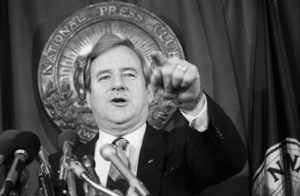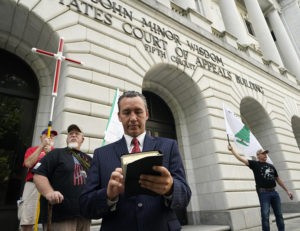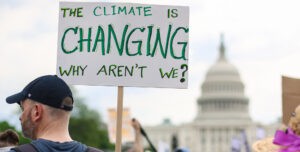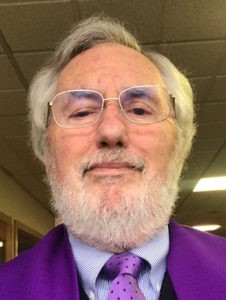Libertarians and evangelicals are hard to tell apart these days. Is that because libertarians are becoming more religious or because evangelicals are becoming more political?
I’m reminded of the corporate executive who once explained to me, “Remember that mergers are always takeovers.”
Was the new affiliation between evangelicals and libertarians a merger or an acquisition? Did evangelicals first start talking like libertarians or did libertarians first start talking like evangelicals?
I venture an answer: Libertarianism is the “heresy” that invaded evangelical churches in the last three decades and turned the churches into the religious arm of a political ideology. Evangelicals have become libertarians.
Barbara O’Brien argued this very point in January: “They have replaced Jesus’ moral and ethical teachings (which, you might recall, emphasized taking care of our neighbors, and everybody is a neighbor) with a libertarian position that individual rights supersede everything else, including the well-being of others. And that the greatest evil in the world is government coercion, no matter what purpose is being served.”
The she quoted Michael Gerson, writing in a Washington Post op-ed, who said of libertarian objections to vaccines: “This is heresy compounded by lunacy.”
E.J. Dionne makes a similar argument when he suggests that evangelicals see hostility to government (including science) as a way of fighting back against a secular culture. The reasoning is that scientists are liberals, climate change is a liberal doctrine, it’s promoted by the government. It must be false because it is just a secular conspiracy.
“I argue that evangelicals and libertarians now have morphed into one entity around the issue of truth and freedom.”
I argue that evangelicals and libertarians now have morphed into one entity around the issue of truth and freedom. This is not the first opponent truth has ever faced. The Scriptures record truth vs. power events that stretch from Pharaoh vs. Moses to Jesus vs. Caesar. The church often has struggled with whether to go with the radical truth or to support the status quo. Our record here is spotty and has often been rescued by prophets, storytellers, singers, psalmists and preachers.
The Apostle Paul attempted to guide the church at Corinth through a truth vs. love contest. The historical moment was rooted in some Christians refusing to eat meat that had been offered to idols and others insisting that this was ridiculous. Paul informs the “strong” — the Christians possessing truth (knowledge) — that they lack love. The issue seems not to have been resolved then or now.
Reality: Truth struggles with an array of ideologies in every age.
Climate-change denial as example
There are numerous examples of truth vs. freedom in play in our culture. There are too many to examine one by one, so I have chosen the case of climate-change denial.
Philosopher Rupert Read says, “Climate-denial is certainly the most ‘epic’ form of fake news our culture has ever known.” Climate denial clearly shows the clash between truth and freedom.
American historian William Trollinger, in email correspondence, told me, “Over the past century white evangelicals have become increasingly unmoored from the constraints of truth, and the constraints of their faith, and the constraints of the biblical text.”
“The seeds for climate-denial were planted much earlier by politicians and preachers opposing environmental laws.”
The seeds for climate denial were planted much earlier by politicians and preachers opposing environmental laws. Senator James Inhofe, R-Okla., will always be remembered for his stunt of throwing a snowball in Congress as he tried to discredit climate science.
Then there was the Acton Institute for the Study of Religion and Liberty, a Christian-right and free-market economics think tank. In an editorial on that site called “Global Warming or Globaloney? The Forgotten Case for Global Cooling,” we hear echoes of todays’ vigorous climate-denials. The article calls climate change “a shrewdly planned campaign to inflict a lot of socialistic restriction on our cherished freedoms. Environmentalism, in short, is the last refuge of socialism.”

Jerry Fallwell
And in a real blast from the past there’s Jerry Falwell, who said on CNN, “It was global cooling 30 years ago … and it’s global warming now. … The fact is there is no global warming.”
Southern Baptist preacher, presidential candidate, former governor of Arkansas and Fox News host Mike Huckabee has insisted that global warming is not a reality but a distraction from the real dangers the country faces. As Huckabee quipped in January 2015, “A beheading is a far greater threat to an American than a sunburn.”
When quips and tweets replace truth and facts, we should know we have a problem.
The illusion of freedom
Climate denial gives deniers freedom from truth itself.
“The most crucial of all the attractions of climate-denial is … that it provides would-be libertarians an ultimate freedom,” says Rupert Read. More people than ever are unwilling to be bound by anything, not even truth itself.
“The demand for individual freedom energizes libertarians and evangelicals.”
The demand for individual freedom energizes libertarians and evangelicals. The chorus of evangelical voices raised in protest of COVID restrictions mirrors that same disregard for truth. When COVID-19 first hit our shores, a significant number of evangelical pastors refused to close their doors on Sunday and defied orders by local governments to do so.

Tony Spell, pastor of Life Tabernacle Church of Central City, La., waits outside the Fifth Circuit Court of Appeals in New Orleans, Monday, June 7, 2021. Spell, who flouted coronavirus restrictions last year, prepared Monday to ask the court to revive his lawsuit challenging the restrictions. (AP Photo/Gerald Herbert)
Pastor Tony Spell of Life Tabernacle Church in Baton Rouge, La., said he did not believe his congregation was at risk of getting COVID-19. “The virus, we believe, is politically motivated,” he said. “We hold our religious rights dear, and we are going to assemble no matter what someone says.”
Climate deniers are cut from the same cloth: “How dare you interfere with my rights, my freedom?” Such claims of absolute freedom and rights make up a large portion of the current political noise. The voices are mostly a male choir. Many evangelicals are committed to a male-dominated view of life, and most of the preachers are males. Libertarians are overwhelmingly white and male.
Libertarianism and evangelicalism share a commitment to individualism and consumerism. Both components are dependent upon a notion of absolute freedom and “growthism.” Yet the reality is that continuing with unlimited economic growth over the coming two decades is incompatible with meeting our international obligations on climate change.
“Libertarianism and evangelicalism share a commitment to individualism and consumerism.”
As Kevin Anderson and Alice Bows-Larkin have said, “Avoiding dangerous climate change demands de-growth strategies from wealthier nations.”
“The evidence is crystal clear: Nature is in trouble. Therefore, we are in trouble,” says Sandra Díaz, one of the co-chairs of the UNGlobal Assessment Report on Biodiversity and Ecosystem Services.
Evidence, facts, scientific data sound like whistling in the dark to libertarians and many evangelicals.
The right to complete individual liberty is expressed most clearly in a bastardized version of the Baptist concept of the priesthood of the believer. Too often, the priesthood of the believer ignores the priestly aspect, which suggests a church hierarchy and a community of faith, to put all the focus on the individual believer.
In politics, the priesthood of the believer has become the right to have opinions. “I have my opinion and you have yours” is a constant refrain. People professing to believe in the priesthood of the believer probably would be shocked by J. Whyte’s article, “Sorry, But You Are Not Entitled to Your Opinion.” In the hierarchy of persuasion, beliefs occupy a higher rung than mere opinions, but now opinions have been elevated to a primary argument as in, “Well, you have your opinion and I have mine.”
“The right to complete individual liberty is expressed most clearly in a bastardized version of the Baptist concept of the priesthood of the believer.”
The irony is that such a concept of freedom gives people a licentious freedom of thought. The truth has been packaged by a marketing firm and comes in more sizes, shapes and colors than can be imagined.
Truth is on sale at Walmart — a sort of consumerism of the mind. This is the ultimate freedom. They are willing to concoct stories with no factual basis to trigger liberals. Gov. Ron DeSantis in Florida has made up a “humdinger” of a lie about “woke” math textbooks. He claims math textbooks are teaching Critical Race Theory.
Two forces of irrational thought drive the libertarian/evangelical emotion machine:
- The ability to churn out personalized propaganda and pass it off as the truth has gone into overdrive. As a result, we may be in danger of losing the public sphere altogether.
- The rise of individualist ideology. Aided by an evangelical theology of individual freedom, libertarians and many evangelicals are destroying the public sphere by undermining our shared sense of the value of truth and our trust in the anchor institutions of democracy.
Few libertarians and evangelicals are asking, “What is truth?” It is absurd that we are walking into the mass genocide of climate catastrophe replacing “How dare you!” for “What is truth?” Credibility not only has been undermined; it has been replaced.
The illusion of rationality
Libertarians and evangelicals insist on a philosophy that is rigorously objective. Evangelicals have long insisted that rationality and morality are the major ideas of American ethos. They applied the “scientific method” of Francis Bacon to the Bible, even though the Bible — a book of symbolic, metaphorical language — resists such a method.
The 19th century evangelicals were such thorough rationalists they believed the higher critics of the Bible represented a conspiracy of intellectuals. Today, many evangelicals go on and on until doomsday that there is something elitist, deceptive and dishonest about climate change, science and history. This hard-wired claim to rationality and objectivity, truth and rationality defines libertarianism and evangelicalism.
“A commitment to rational truth and absolute freedom can’t coexist in the same orbit.”
A commitment to rational truth and absolute freedom can’t coexist in the same orbit. Truth imposes restraints on one’s ability to do and believe and think whatever one wants. No card-carrying evangelical ever would suggest that moral freedom requires complete individual license, but that is exactly what they are implying with this insistence on complete freedom.
Read puts it exactly right in my view: “Libertarians (and many evangelicals) can’t stand to be told that they don’t have as much epistemic right as anyone else on any topic that they like to think they understand or have some ‘rights’ in relation to. This sense of feeling free has never been as dominant or more potentially dangerous.”
The prophets of doubt and cynicism
This helps explain the tragic spectacle of evangelical preachers — claiming to have the truth, the whole and literal truth, and nothing but the truth — becoming climate-change deniers, history deniers, science deniers, COVID restriction deniers. The preachers of truth have become the prophets of doubt, cynicism and skepticism.

Thousands of people attend the People’s Climate March to stand up against climate change April 29, 2017. (Shutterstock)
The libertarian and evangelical love of truth and reason has crashed into a limit: their love of the unfettered pursuit of mammon and the freedom to their own opinion, come hell or high water. And according to the scientific data, it’s the high water that’s coming first through rising tides and melting icecaps.
The scientific consensus is clear: More than 95% of climate researchers agree that human activity is causing global warming, and that without action to combat it we are on a path to dangerous temperature rises from pre-industrial levels.
The evidence that climate change is real gets discounted by a bit of trickery. Climate deniers are tricksters. They claim all these elitist scientists and radical left-wingers are agreeing with one another because they are scratching each other’s backs. The tricksters have convinced many people that climate change is another political con. This makes sense to an already mistrustful public.
“Climate deniers are tricksters.”
Given the choice between the truth that we are going to have to rein in our appetites for “more” and our absolute freedom to do as we please for as long as we please, then that truth itself is crucified on the scaffold labeled freedom. The obsession with individual freedom increases mistrust among the public. Libertarians and many evangelicals become voluntaristic and contrarian because they can. They end up believing what feels good, what feels right, what they want to believe.
Not wanting to accept the scientific reality of ecology and climate science, they deny them. They end up looking like people standing in a church on the Atlantic Ocean singing “kumbaya my Lord” while the waters of the Atlantic fill the building.
Absolute freedom aligned with a pretentious rationality and a strong insistence on doubt, cynicism and mistrust puts libertarians and many evangelicals on a downward spiral that endangers the entire planet. To sum up, the libertarian-evangelical alliance has been raging for decades but only recently has become so obvious. The politics of libertarianism have overwhelmed the theology of evangelicalism.
Are we prepared to rethink the elevation of freedom over truth? After all, Jesus says the truth makes us free.

Rodney Kennedy
Rodney W. Kennedy currently serves as interim pastor of Emmanuel Freiden Federated Church in Schenectady, N.Y., and as preaching instructor Palmer Theological Seminary. He is the author of nine books, including the newly released The Immaculate Mistake, about how evangelical Christians gave birth to Donald Trump.
Related articles:
Rock the boat, don’t tip the boat over | Opinion by Amy Chilton
Baptist pastor Wade Burleson running for Congress from Oklahoma


